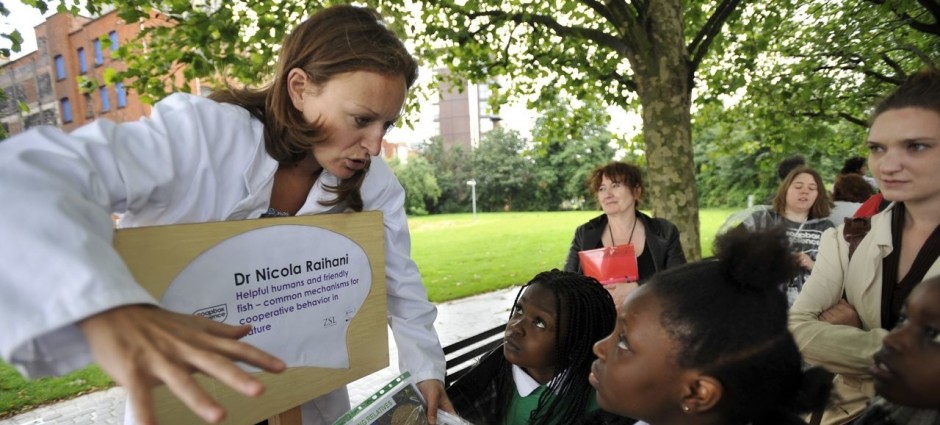 I work at UCL/University of Bristol investigating the genes involved in the evolution of social behaviour in wasps. Wasps are the ideal organism for studying social evolution as they display the full repertoire of social behaviour; from solitary wasps where a single female performs all the duties required to successfully raise her offspring, to highly social wasps where these duties are split between the reproductive queen and the non-reproductive workers. Starting my career as a marine biologist, I never thought I’d end up working on wasps, but I find my research continually fascinating, it’s taken me to some amazing places, and has totally changed my perception of wasps (despite being stung on numerous occasions!)
I work at UCL/University of Bristol investigating the genes involved in the evolution of social behaviour in wasps. Wasps are the ideal organism for studying social evolution as they display the full repertoire of social behaviour; from solitary wasps where a single female performs all the duties required to successfully raise her offspring, to highly social wasps where these duties are split between the reproductive queen and the non-reproductive workers. Starting my career as a marine biologist, I never thought I’d end up working on wasps, but I find my research continually fascinating, it’s taken me to some amazing places, and has totally changed my perception of wasps (despite being stung on numerous occasions!)
You can catch Daisy on a soapbox as part of Soapbox Science London on 26th May where she will give a talk: “What’s the point of wasps?”
SS: How did you get to your current position?
DT: My PhD was in marine biology, but when this finished I went travelling and it was on a trip to the Amazon that I became fascinated by terrestrial ecology. When I got back to the UK I saw a position advertised looking at the behaviour of wasps and, although this was a huge departure from my previous research, the project used many of the same methodologies I’d employed in my PhD – using gene sequencing to identify the molecular mechanisms which cause behavioural or physiological changes. I’m now able to apply the laboratory and field methods I’ve learnt through the course of my career to answer very different scientific questions.
 SS: What, or who, inspired you to get a career in science?
SS: What, or who, inspired you to get a career in science?
DT: Very cliché, but David Attenborough. I grew up watching his documentaries, then The Blue Planet came out during the first year of my marine biology degree and I think attendance at lectures reached a record high. Since then I’m continually inspired by meeting scientists from across the world who are incredibly passionate about the work they do.
SS: What is the most fascinating aspect of your research/work?
DT: The insects I work with! Sitting for hours with your head in a wasps nest probably isn’t everyone’s idea of fun, but they display a huge range of behaviours and lead complex and interesting social lives, something which very few people are aware of.
SS: What attracted you to Soapbox Science in the first place?
DT: I volunteered at Soapbox Science a few years ago and loved seeing scientists bringing complex and cutting edge research to the public in an interesting and accessible manner.
SS: Sum up in one word your expectations for the day
DT: Nervousness!
 SS: If you could change one thing about the scientific culture right now, what would it be?
SS: If you could change one thing about the scientific culture right now, what would it be?
DT: There is huge pressure on early career scientists because research posts are usually so short that no sooner have you got one position, you have to start looking for your next job. This creates an incredibly stressful work environment and the lack of stability leads to a lot of highly skilled researchers leaving academia. Until there is more stability for post-docs, I think science will continue to lose a lot of great people.
SS: What would be your top recommendation to a PhD student considering pursuing a career in academia?
DT: Take the time to find a subject you’re passionate about and you’ll have the most rewarding career ahead of you.
